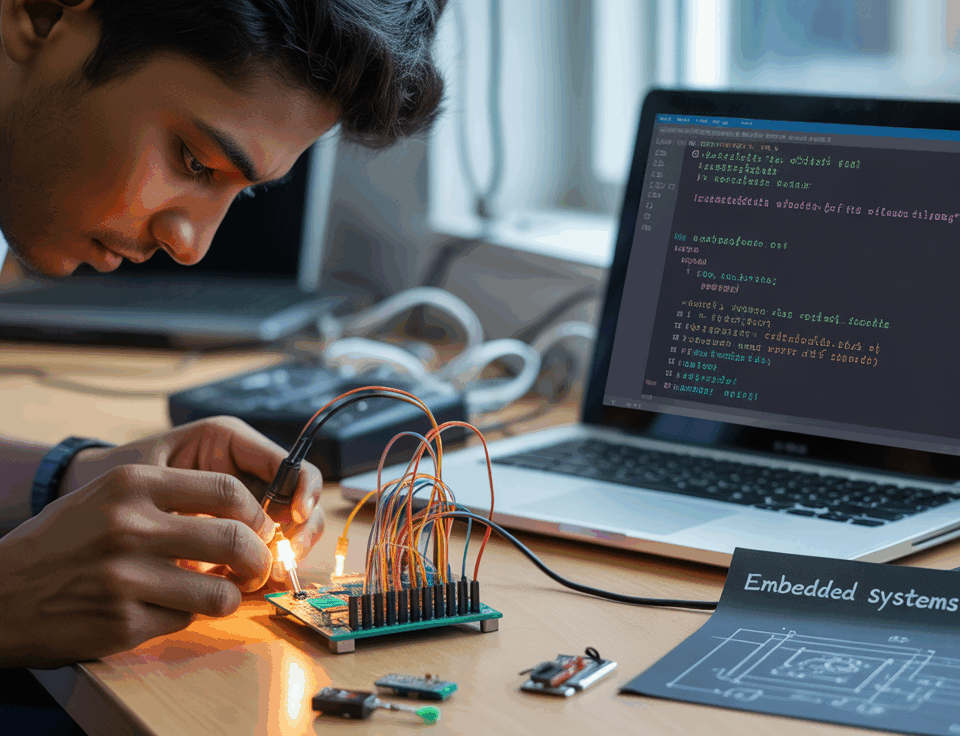
Navigating the Digital Frontier: Why an IoT Certification is Your Next Career Catalyst
September 2, 2025
Embedded and Beyond: Why Your Next Career Step is a Robotics Certification
September 11, 2025In the rapidly expanding world of technology, microcontrollers act as the fundamental building blocks, discreetly powering devices from your personal smartphone to massive industrial automation systems. They are the core intelligence behind smart gadgets that are now integral to our daily lives. While comprehending their function is a valuable skill, mastering their application is a direct path to a rewarding career. This is precisely where a comprehensive microcontroller course becomes indispensable.
At Elysium Embedded School, learners gain more than just technical training—they receive a structured pathway to success. With a carefully designed syllabus, expert instructors, and a strong focus on real-time projects, the school ensures students acquire both theoretical knowledge and practical expertise. This holistic approach not only enhances understanding but also prepares individuals for thriving careers in embedded systems and IoT applications.
Table of Contents
Why a Microcontroller Course is Your Career Launchpad
The modern world is profoundly interconnected, with the Internet of Things (IoT) at the forefront of this digital revolution. At the heart of every IoT device, every smart appliance, and every robotic system, you’ll find a microcontroller. These small yet powerful processors are responsible for everything from reading simple sensor data to controlling complex machinery. For anyone looking to forge a career in automation, robotics, IoT, or consumer electronics, a strong grasp of microcontrollers is essential.
A microcontroller course is the vital link that transforms abstract academic concepts into practical, hands-on abilities. It teaches you not just about microcontrollers, but how to program them, integrate them with other hardware, and develop a fully functional project from the ground up. Elysium Embedded School has established itself as a premier provider, offering a microcontroller course that combines practical experience, industry-recognized certification, and dedicated career support. This program is much more than a class; it’s a foundation for your professional journey.
Who Should Join a Microcontroller Course?
A well-designed microcontroller course is suitable for a diverse group of individuals seeking to advance their skills and career prospects.
- Engineering Students: Students in fields like Electronics and Communication Engineering (ECE), Electrical and Electronics Engineering (EEE), Computer Science Engineering (CSE), and Information Technology (IT) will find this course immensely valuable. It equips them with the practical skills needed to supplement their academic learning, giving them a significant advantage in a competitive job market.
- Hobbyists and Creators: If you are passionate about building and have an innovative idea for a smart device, a microcontroller course will give you the technical skills to turn that idea into reality. It’s ideal for those who want to move past using pre-made kits and design their own custom projects.
- Working Professionals: For those already in the tech sector, a microcontroller courses is a perfect way to enhance your expertise. With the rapid expansion of IoT and embedded systems, adding microcontroller knowledge can create opportunities for new roles and career advancement.
- Job-Seekers: In today’s hiring landscape, a certification is a powerful tool. A microcontroller certificate course provides concrete proof to potential employers that you have the verified skills and knowledge required for the job.
The right microcontroller course is crafted to meet the varied needs of this audience, providing a clear pathway for everyone from beginners to seasoned experts.
What Makes a Course the Best Microcontroller Course?
Choosing the best microcontroller course requires looking beyond just the syllabus. An exceptional program is defined by a comprehensive strategy for learning and career readiness. It’s about a holistic approach that ensures you are not just knowledgeable, but truly capable.
1. Hands-on, Project-Based Training
The best microcontroller course goes far beyond theoretical instruction. It offers extensive, hands-on training using real hardware platforms. At Elysium Embedded School, you won’t just read about microcontrollers; you’ll actively work with popular architectures like ARM, AVR, PIC, 8051, and STM. This practical, project-based approach is crucial for true skill development, allowing you to build real-world applications and troubleshoot challenges as they arise. This type of course transforms concepts into tangible skills.
2. An Industry-Relevant Curriculum
An excellent course syllabus is regularly updated to reflect current industry demands. It should cover everything from fundamental principles to advanced applications, such as real-time operating systems (RTOS) and communication protocols like I2C, SPI, and UART. The curriculum should ensure that the skills you acquire are immediately useful in a professional environment, preparing you for roles in a variety of sectors, including automotive, consumer electronics, and industrial automation.
3. Validated Competency with Certification
A certificate from a respected institution adds significant credibility to your resume. A microcontroller certificate course from Elysium Embedded School confirms your technical skills, giving employers confidence in your abilities. This validation acts as a powerful signal in a competitive job market, proving that you have completed a structured program and are capable of working on complex embedded systems.
4. Robust Placement and Career Support
The ultimate objective of a microcontroller course is to help you secure a job. The best programs offer dedicated placement support, including guidance on resume writing, mock interviews, and direct connections to a network of hiring partners. This comprehensive support system is what transforms a good course into a career launchpad, ensuring your skills translate directly into professional opportunities.
5. Flexible and Accessible Learning Options
Understanding that students have different needs, an ideal microcontroller course provides both in-person and online options. This flexibility allows you to choose the learning format that best fits your schedule and location, making a high-quality education accessible to a broader audience. Whether you prefer the direct engagement of a physical lab or the convenience of an online platform, a top-tier microcontroller course should accommodate you.
6. Expert Mentorship and Guidance
The quality of a microcontroller course is heavily influenced by its instructors. Look for a program that offers expert mentorship from professionals with real-world industry experience. The ability to learn from and ask questions of experienced engineers can significantly accelerate your learning and provide invaluable insights into best practices and advanced techniques. A great microcontroller course is led by great mentors.
7. Focus on Debugging and Problem-Solving
Beyond just programming, a superior microcontroller course places a strong emphasis on debugging and troubleshooting. These are critical skills for any embedded systems professional. The program should teach you not only how to write code but also how to identify and fix errors in both software and hardware, preparing you for the real-world challenges of a technical role. This focus on problem-solving is a hallmark of a truly effective course.
A Detailed Look at the Microcontroller Course Syllabus
The syllabus of a truly great microcontroller course is carefully structured to build skills progressively, from foundational concepts to complex projects.
- Module 1: Microcontroller Fundamentals: This initial module introduces the fundamentals of embedded systems. You will learn the key distinctions between microcontrollers and microprocessors and grasp the core components of a microcontroller system, which forms the basis for all subsequent learning.
- Module 2: Embedded C Programming: A vital part of any microcontroller course, this module focuses on the programming language used for embedded systems. You will master coding concepts, memory management, and learn how to write C code to interact directly with a microcontroller’s hardware.
- Module 3: Architecture & Peripheral Interfacing: This module of the course delves into technical details. You will explore the architectures of common microcontrollers and learn how to interface with essential peripherals like GPIO, timers, interrupts, ADC, and PWM—the essential building blocks for any embedded project.
- Module 4: Circuit Design & Input/Output: This module bridges the gap between software and hardware. You’ll gain hands-on experience with sensor integration, controlling actuators, using displays, and understanding serial communication protocols like UART, I2C, and SPI.
- Module 5: Real-Time Operating Systems (RTOS): As projects become more sophisticated, so does the need for an RTOS. This part of the microcontroller course covers the basics of multitasking, real-time scheduling, and task management, preparing you for advanced embedded system design.
- Module 6: Debugging & Testing: No project is without bugs. This module of the microcontroller course teaches the critical skills of debugging and troubleshooting. You will learn to use common tools and apply best practices to optimize your code and hardware designs.
- Module 7: Practical Projects: This is the practical culmination of the microcontroller course. You will apply all the skills you’ve acquired to build real-world projects, such as smart home automation systems, IoT devices, robotics projects, and industrial controllers. These projects form the core of your professional portfolio.
- Module 8: Certification & Career Readiness: The final module of the course is dedicated to preparing you for the job market. This includes project evaluations, understanding the certification process, and building a professional portfolio that showcases your work.
Online vs. Classroom: Choosing Your Microcontroller Course
Deciding between an online and classroom-based microcontroller course depends on your personal learning style and schedule.
- Benefits of an Online Microcontroller Course: An online microcontroller course offers unmatched flexibility. You can learn at your own pace from anywhere in the world, which is perfect for working professionals or busy students. Online programs often include recorded sessions, allowing you to review complex material whenever you need.
- Benefits of an In-Person Microcontroller Course: A traditional classroom setting offers a unique learning environment. It provides direct access to a fully equipped lab for immediate hands-on practice. It also fosters peer networking and allows for direct, in-person guidance from instructors.
- Hybrid Learning Models: Many leading institutions, including Elysium Embedded School, offer a hybrid approach, combining the best of both. This format of a microcontroller course provides the flexibility of online learning with the benefits of practical, hands-on lab sessions.
The Real Advantages of a Certified Microcontroller Course
A microcontroller course with certificate is more than just an educational milestone; it’s a strategic and smart investment in your professional future. In today’s competitive landscape, this credential provides tangible benefits that can dramatically impact your career trajectory and earning potential.
Enhanced Credibility and Professional Validation
A certification from a respected institution, such as Elysium Embedded School, serves as a third-party endorsement of your skills. It validates your expertise and assures potential employers that you have undergone a rigorous, structured training program. This validation makes your resume stand out in a pool of applicants and signals to hiring managers that you possess a verifiable skill set, which is crucial for roles in embedded systems and IoT. This kind of course provides the proof you need to build professional trust.
Building a Powerful Project Portfolio
The best microcontroller programs are project-based, guiding you through the creation of real-world applications. This process helps you build a professional portfolio that serves as concrete evidence of your capabilities. A strong portfolio, filled with projects you designed and built yourself, speaks volumes about your ability to turn theoretical knowledge into working products. This hands-on experience is often more impactful than a simple degree, showcasing your passion and practical skills to potential employers.
Boosting Your Job Readiness and Confidence
The structured curriculum and practical projects within a microcontroller course are specifically designed to bridge the gap between academic learning and industry demands. This comprehensive training not only equips you with the technical skills needed for the job but also boosts your confidence. By the time you complete you course, you will be better prepared to handle technical challenges and ace interviews, knowing that you have the practical experience to back up your claims.
Gaining a Significant Competitive Advantage
In a crowded job market, a specialized certification gives you a significant edge over other candidates. It proves that you have acquired the specific skills needed for highly sought-after roles in embedded systems and IoT. This is a powerful differentiator that can make you the preferred candidate for employers looking for specialized expertise. A microcontroller course is your ticket to standing out from the crowd and proving your worth.
Unlocking Access to Specialized Roles and Higher Pay
A microcontroller certificate course often serves as a launchpad into lucrative, in-demand job roles. Certified professionals are highly valued in the industry and are often considered for positions like Embedded Systems Engineer, IoT Developer, Firmware Engineer, and Robotics Engineer. This specialized knowledge directly translates into higher earning potential and faster career progression, as companies are willing to invest more in candidates who can demonstrate proficiency in these critical areas.
Demonstrating Commitment to Continuous Learning
Earning a certification through a microcontroller course shows a proactive approach to your career. It demonstrates a commitment to continuous learning and staying current with industry advancements. Employers highly value this dedication, as it suggests you are a motivated individual who will adapt to new technologies and continue to grow within the company. This forward-thinking mindset is a strong indicator of long-term success.
Why Pursue a Microcontroller Course in India?
India’s technology sector is booming, making it an ideal place to pursue a microcontroller course.
- Affordable Education: India provides high-quality technical education at a fraction of the cost compared to many international options.
- Expanding Job Market: The country’s electronics, IoT, and automotive sectors are growing rapidly, creating a high demand for skilled professionals.
- Access to Top-Tier Programs: Reputable institutions like Elysium Embedded School offer some of the best microcontroller course programs available, with syllabi designed to meet both global and local industry needs.
A microcontroller course in India offers a perfect combination of quality, affordability, and career opportunities.
Frequently Asked Questions
-
What prerequisites are needed for the Microcontroller Course at Elysium Embedded School?
There are no strict prerequisites. While some basic programming knowledge is helpful, beginners are welcome and will be taught from the ground up.
-
How long does the microcontroller course typically last?
The duration of the microcontroller course can vary from a few weeks to several months, depending on the program chosen and the depth of the modules.
-
Will I receive a recognized certificate after completing the course?
Yes. Upon successfully completing the microcontroller course, students are awarded an industry-recognized certificate, which is a key component of the program.
-
Does Elysium Embedded School provide placement support for graduates?
Yes. Elysium Embedded School offers comprehensive placement assistance, including resume workshops, interview training, and job placement support for all microcontroller course graduates.
-
Can students outside major cities join the course?
Absolutely. The online learning modes of the microcontroller course make the program accessible to students across India, breaking down geographical barriers.
Conclusion
Microcontrollers are the unseen engines driving today’s smart world, from IoT devices and robotics to industrial automation and consumer electronics. As industries rapidly adopt these technologies, the need for professionals with strong expertise is higher than ever. A well-designed microcontroller courses not only equips learners with essential technical knowledge but also provides the hands-on practice and industry recognition required to thrive in competitive career paths.
At Elysium Embedded School, we deliver one of the best microcontroller courses in India, built around a structured syllabus, practical labs, flexible online learning options, and globally recognized certification. With expert trainers and a career-focused approach, our program ensures that students and professionals alike gain job-ready skills that truly matter.
Whether you are a student eager to explore embedded systems, a professional looking to upskill, or a hobbyist driven by curiosity, this microcontroller course with certificate is your gateway to future-ready opportunities. Don’t wait to invest in your growth—the right time to begin is now. Take the leap with Elysium Embedded School and transform your potential into a thriving career in the world of microcontrollers and IoT.













